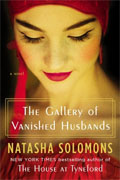The Gallery of Vanished Husbands
Natasha Solomons
book reviews:
· general fiction
· chick lit/romance
· sci-fi/fantasy
· graphic novels
· nonfiction
· audio books
· author interviews
· children's books @
curledupkids.com
· DVD reviews @
curledupdvd.com
newsletter
win books
buy online
links
home
for authors
& publishers
for reviewers

 |
The Gallery of Vanished Husbands Natasha Solomons Plume Books Paperback 352 pages August 2013 |
|
Life changes for Juliet Montague on her thirtieth birthday. Forced to examine her feelings with her usual frankness, Juliet enjoys a sunny morning in Charring Cross where “a laundered sky stretches a taut blue above Trafalgar Square.” Although her husband, George, has long since deserted her, she’s able to find comfort in the arms of her two children, Frieda and Leonard, while her parents Mr. and Mrs. Green unhappily watch over rebellious Frieda in their suburban Chislehurst home.
In a series of perceptions, from Juliet laboring for her father in his spectacle store, where the “gray days stretch on endless and unremarkable,” to the obscure and colorful figurative paintings of Juliet’s first artist friend, Charlie Fussell, to her fledging Art Gallery and her friendship with famous recluse Max Langford (who never leaves bucolic Dorset), Solomons gathers tenuous threads in an elaborately woven tapestry of art and the nascent rebellion of a generation of young artists who seek to break from the conventionality of their lives in search of a new definition. Beginning her novel in 1958, Solomons has her heroine caught between two worlds—her conservative Jewish community and her desire to emerge herself in the era's more utopian yearning and infant disregard for convention. From the outset, Juliet knows she’s not a painter but a looker: “I have a knack, I can’t draw or paint but I can see pictures.” Ironically, it is Charlie who paints his best picture of her when he is not yet twenty-one, “this dark-haired woman with her bowl of apples.” We feel the emotions of Juliet’s youthful artists and her traditional family as the world is transformed before their eyes. Whisking Juliet away to Devon then onto Venice Beach, California, Solomons makes us fall in love with the quiet beauty of Max’s ancestral home where Juliet admires the texture of its shadows and the clouds that sweep across the sky. There’s also the blinding sunlight of Venice Beach and all of the “flotsam and jetsam” when, for the first time, Juliet realizes she’s free. With the little house in Chislehurst feeling so very far away, Juliet’s American experience gives her the rare urge to move on and become someone new even when “that piece of her would always remain lost chained to George.” Although Solomons’ tale is essentially character-driven, figurative painting plays an essential role in the story, from the portraits painted of her over the years to Max Langford’s half-lit stencils sketches, framed woodcuts, and linocuts, not to mention those paintings by Charlie, Jim and Phillip, who exhibit at Juliet’s gallery and whose paintings represent a new and distinct breath of life. As Juliet successfully progresses in her undertaking, uncovering many fascinating artists, she’s plunged into her immediate family dynamics that prove to be just as entangling as her bourgeoning love for Max. Solomons makes us feel the quiet, yearning quality of Juliet’s voice, tinting it with colors in a memorable afterglow. Like her father’s beloved spectacles, Juliet discovers that art has sharpened her perceptions of the world around her. Only in her own gallery can Juliet truly dowse for talent and seek artists who want bring their work to life in a new, revitalized landscape that is refreshed and full of color, free from the humdrum of the world around them. Originally published on Curled Up With A Good Book at www.curledup.com. © Michael Leonard, 2013 |
| Also by Natasha Solomons: |
|
|
|
 Click here to learn more about this month's sponsor! |
|
| fiction · sf/f · comic books · nonfiction · audio newsletter · free book contest · buy books online review index · links · · authors & publishers reviewers |
|
| site by ELBO Computing Resources, Inc. | |
 After George vanished, Juliet was labeled an “aguna” by the Orthodox Jewish community. A recalcitrant husband unwilling to divorce his wife, George left behind a hole and “a round scorch mark” across the lives of his wife and children. Told she may divorce George in the civil courts but not in the eyes of God, Juliet suddenly sees her existence washed in a nondescript gloom. She wonders what “concealed defect” in her made George disappear.
After George vanished, Juliet was labeled an “aguna” by the Orthodox Jewish community. A recalcitrant husband unwilling to divorce his wife, George left behind a hole and “a round scorch mark” across the lives of his wife and children. Told she may divorce George in the civil courts but not in the eyes of God, Juliet suddenly sees her existence washed in a nondescript gloom. She wonders what “concealed defect” in her made George disappear.